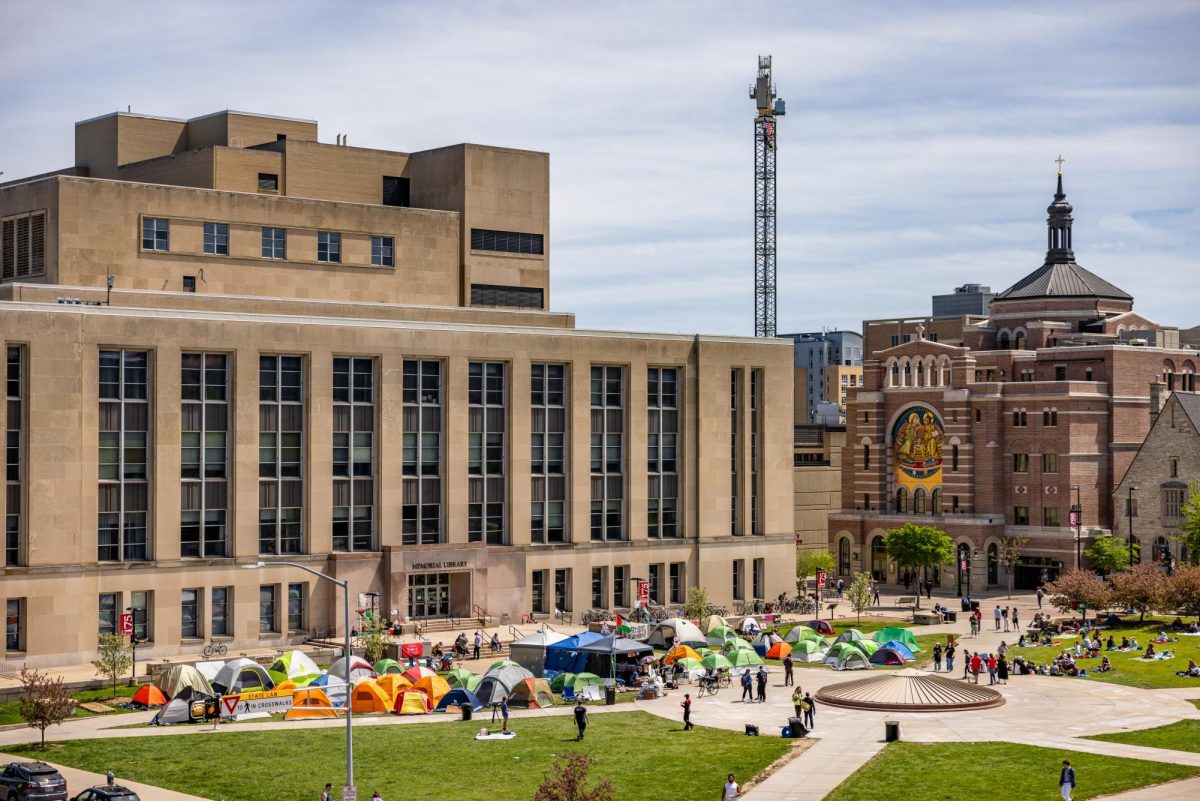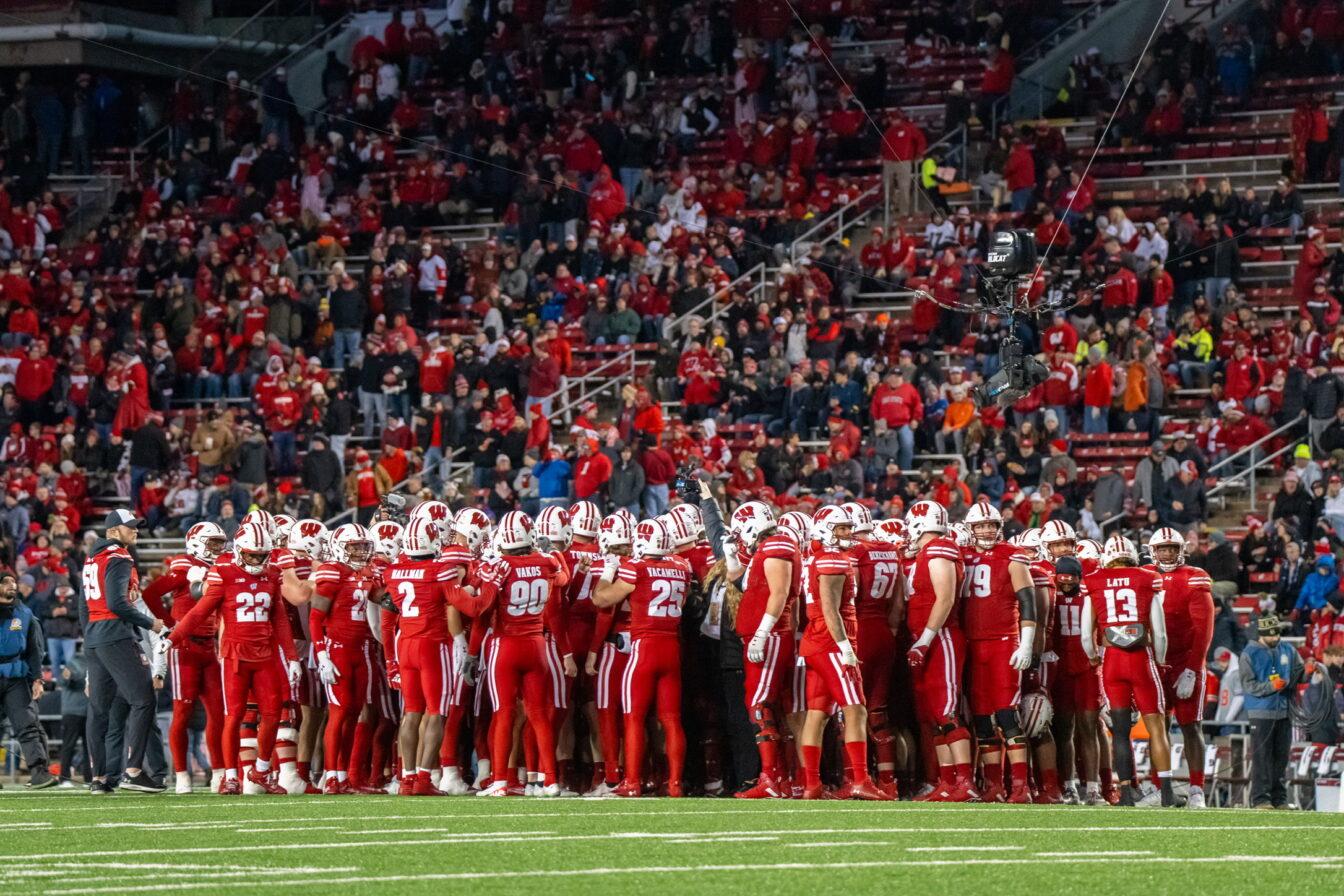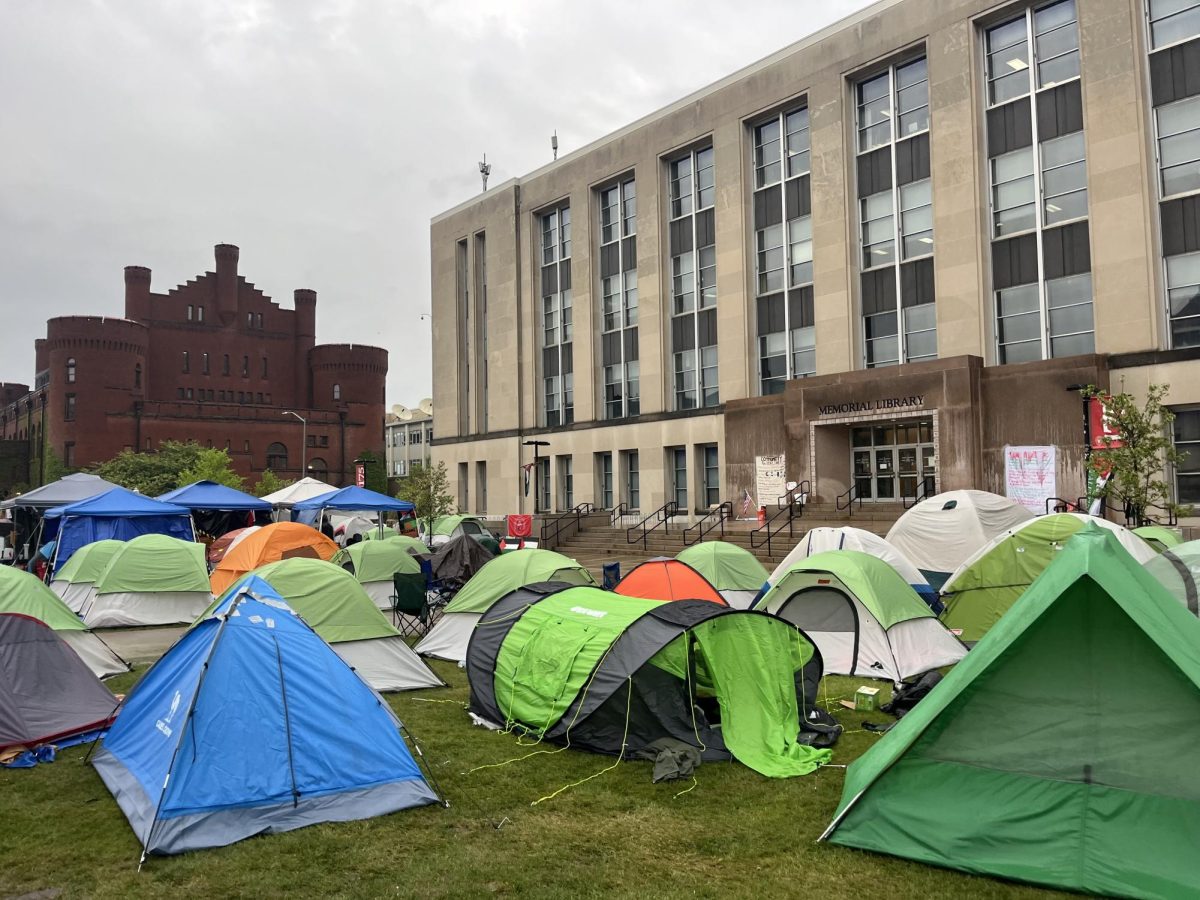[media-credit name=’ANDRIY PAZUNIAK/Herald photo’ align=’alignright’ width=’336′] [/media-credit]Standing outside Camp Randall on a Saturday afternoon in September, University of Wisconsin Police Officer Aaron Chapin took a deep breath and recognized a familiar scent in the air.
[/media-credit]Standing outside Camp Randall on a Saturday afternoon in September, University of Wisconsin Police Officer Aaron Chapin took a deep breath and recognized a familiar scent in the air.
"I'm starting to smell the alcohol," Chapin said while patrolling his post at Gate 14, less than 10 minutes before the Wisconsin Badgers were scheduled to kick off against San Diego State.
It was game day in Madison and waves of fans emblazoned in cardinal and white began to filter through the south gates of Camp Randall.
Students spilled in from house parties on Breese Terrace, flooding the southwest entrance to the stadium. More fans streamed in along the sidewalks running past Engineering Hall and the Shell.
Chapin watched the rising red tide from inside the south gates and took another breath.
"Yeah," he said nodding. "I can smell it. Just a little bit."
A few seconds later, a side gate swung open and a woman in a red tank top and handcuffs stumbled through with a police officer by her arm.
Another woman wearing a sleeveless white Wisconsin shirt tried to follow her friend inside, but was stopped by police and was subsequently questioned by Chapin's partner, Dane County Sheriff's Deputy James Reiter.
"Hopefully she doesn't talk herself into getting arrested," Chapin said before walking over to his partner.
But she did. After six years on the UW police force, Chapin knew he caught his first underage drinker of the day the moment she lied about her name being "Stephanie."
One of 52 people arrested at Camp Randall Sept. 16, "Stephanie" contributed to the blistering pace of arrests UW is setting to begin the 2006 season.
Going into this Saturday's game against Northwestern, UW's two-game arrest total stands at 102 — more than tripling the opening two-game total of every Big Ten university except Iowa and Michigan State, which still trail UW by 62 and 67 arrests, respectively.
'The numbers are scary'
Five years ago, UW Police Department Assistant Chief Dale Burke said he would have given a more optimistic answer when asked whether UW could significantly curb the amount of game-day incidents.
But now?
"We've seen a fairly significant rise in our numbers, both campus-wide and at football games, which suggests that not only is it not improving, it's actually getting worse," Burke said. "And so now, I'm not as confident that it's headed in the right direction."
After the first two home games in 2005, police arrested 33 people and issued 39 citations at Camp Randall.
But this year UW surpassed both marks before the final whistle blew in its first home game in 2006 — against Division 1-AA opponent Western Illinois.
And during the Badgers' second home game, against San Diego State, police arrested 41 people by halftime.
Compared to the first two home games of 2005, the number of alcohol possession citations in 2006 has more than doubled, while the number of underage alcohol citations has more than tripled.
"The numbers are scary," Interim Dean of Students Lori Berquam said. "I wish I had the magic answer for why this is happening, but I don't think there is one."
And it's not only UW administrators who have noticed the growing trend of unruly behavior.
"Before, it was kind of a novelty. You could laugh it off as a couple of guys acting stupid and it didn't cause that big of a problem," UW senior and four-year season ticket holder Zach Kulak said. "But now, not a game goes by where I'm not sitting next to someone who gets ejected or there isn't some conflict somewhere. It's a serious problem."
Though alcohol has always played a primary role in the level of unruly fan behavior at UW football games — and is still considered the No. 1 factor — both Berquam and Burke said the rise in the level of alcohol abuse and intoxication has become a growing concern.
"The dangerousness of the high-risk behavior is what scares me the most," Berquam said. "It goes beyond just drinking to have a good time — it's drinking to incapacitation."
Representatives from other universities, Burke said, often cite the "level of drunkenness" at UW football games as one of the main factors separating Camp Randall from the other Big Ten stadiums.
"They really enjoy the atmosphere, they're impressed by the energy level of the crowd and the creativity oftentimes that they witness," Burke said. "Then you take them backstage and they see what we're dealing with, and they go, 'Well how does this happen?' They're amazed at the level of drunkenness that some people get to. They say things like, 'Well our students drink, but not like this.'"
UW students drink
While Chapin and Reiter waited for the go-ahead to bring their underage drinker into the Camp Randall police center for booking, another woman in handcuffs arrived and was told to stand facing the white cinder-block wall next to "Stephanie."
The woman wavered, struggling to stand as a police officer switched her handcuffs from the metal to the plastic variety.
A second officer asked the woman her age and, through her sloshed speech, was only able to decipher half of her response.
"…teen," the woman said, prompting the officer to repeat the question.
Before the woman could answer, the large, red metal doors outside the police center opened and Chapin escorted "Stephanie" into the long, windowless room.
"If you're in here, you're either wearing one of these or one of those," Chapin said, pointing to his badge with one hand and, with the other, to the bundles of plastic handcuffs hanging immediately to the right of the door.
Police were scattered about the long, windowless room, but most congregated around the three rows of folding chairs where the people wearing plastic handcuffs were seated.
"Stephanie" immediately spotted her friend in the red tank top sitting in the second row and burst into laughter before an officer took her booking photo.
Behind her, a police officer clutched his clipboard and leaned forward until his eyes were level with a man sitting in the front row with his lips tight.
"You're going to plead the Fifth, now?" the officer asked. "We caught you with alcohol, you're ID says you're not 21, and you just blew over a .1. And now you're going to plead the Fifth?"
As Chapin began working with the booking officers to get "Stephanie" into the system, the red doors opened and the woman who stood with "Stephanie" outside is escorted directly to one of the two holding cells at the back of the room.
"Detox," the escorting officer said.
A shirtless man wearing only jeans and Herb Kohl campaign stickers quickly followed. He took a seat next to "Stephanie's" friend, who was preoccupied in offering legal advice to the man seated in front of her.
"They already caught you, so just talk to them," a friend of "Stephanie" told the man.
"Who are you, his lawyer?" the police officer asked.
The whole scene made Associate Dean of Students Elton Crim shake his head.
Since Berquam was named interim dean of students over a year ago, a representative from her office has stayed inside the police center during every home game to serve as an advocate for the students, providing encouragement or advice when needed.
And Sept. 16, it was Crim's turn.
"A lot of students are going to be getting their invitations," he said, referring to letters that students who are arrested receive from the dean of students' office calling them in for a meeting.
Chapin returned from completing his paperwork and grabbed a bottle of water.
"Stephanie" was the 11th person arrested at Camp Randall that day, and by the time Chapin headed to his next post — the Camp Randall student section — the total had climbed to 16.
It was less than 10 minutes after kick off.
What can be done?
Standing in the top row of section M, Chapin stared out across the red sea below him and talked about his love for UW athletics.
As he began talking about attending Badger home games with his kids — one of which was born the night of the upset win over Ohio State in 2003 — sections O and P launched another "eat shit, fuck you" chant that quickly intensified as other sections joined in.
"But I don't take them to football games," Chapin said, adding he usually only goes to women's games with his family, where the crowds are "more mature."
Beside the obvious influence of alcohol, both Chapin and Burke listed a number of other factors influencing the level of unruly crowd behavior at home football games, including kick-off times and the quality of the Badgers' team.
The logic follows that the earlier the game, the less time fans have to get themselves intoxicated. And the better the game, the more involved fans are in actually watching it instead of being distracted by other unruly activities.
"For those of us in law enforcement, if we can play all of our games at 11 a.m., we'd be happy," Burke said. "And again, if we had our preference, we'd like a high-scoring, competitive game, just because we think that's what people enjoy most."
However, as universities play an increasingly smaller role in scheduling decisions, Burke said universities are searching for any way to significantly reduce unruly fan behavior.
"Because of the new television contracts and the expansion of ESPN's control over college football, we're probably going to be facing fewer 11:00 games in the future and more 2:30, 6:00, 7:00," Burke said.
One step UW took this year was the implementation of a new ticket policy allowing the athletic department to revoke season tickets from any fan caught engaging in unruly or illegal behavior at any Badger home game.
Six UW football fans have already lost their ticket privileges this year as a result of the policy, three of them stemming from the Sept. 16 San Diego State game.
Though no new policies are on the table for this year, Burke said the university would assess the current polices at the end of the season and determine if any additional changes need to be made.
The difficulty, Burke added, is that there is only so much the university can feasibly do.
As Chapin said atop Section M, "you can't kick out the entire student section."
However, if the level of unruly behavior continues to rise, Burke said there are always more stringent policies that could be enforced.
"Could we check everybody at the door as they come in, not only if they're carrying alcohol, but if they had (been drinking) alcohol? I don't know," Burke said. "But somehow we have to get the message across that there's a consequence for being that drunk or engaging in certain types of unacceptable behaviors at Badger home games."
Though Burke does not think the university will implement such a severe policy in the foreseeable future, he warned that all it would take is "one horrible incident."
"If something really bad happens, all bets are off," he said.
The final whistle
As the pace of the game slowed down late in the second half, so did the number of calls Chapin received over his radio from the stadium operations center — which monitors the entire Camp Randall crowd through a series of security cameras and relays potential transgressions around the stadium to nearby officers.
Including "Stephanie," Chapin and Reiter made two arrests during the game and ejected two others.
Both of the ejections came after the operations center caught students with alcohol in the stands — one with a small bottle of Captain Morgan, the other with a flask.
With the final whistle only minutes away, Chapin and Reiter moved down toward their next and final post on the field, patrolling the tunnel underneath Section P.
After the Badgers run off the field and the band begins its Fifth Quarter, the other officers patrolling the field begin catch up on each other's day.
One of the unique benefits of working game days, Chapin said, is being able to work with police officers who come in from across the state.
The large pool of officers not only ensures enough are on patrol during the game, but also allows for old friends to see each other again.
While attending high school in McFarland, Reiter went on frequent "ride-a-longs" with UWPD Detective Harlan Hettrick, inspiring him to become a police officer himself.
So, when Hettrick saw Reiter in full uniform for the first time in the police center before the officers went to their posts, Hettrick needed to get a picture.
"It was one of the proudest moments of my life," he said.
After the band played their last song, Chapin walked into the near-empty police center and heard the day's final totals: 52 arrests, 53 citations issued, and seven people taken to detox.
Just another game day in Madison.














